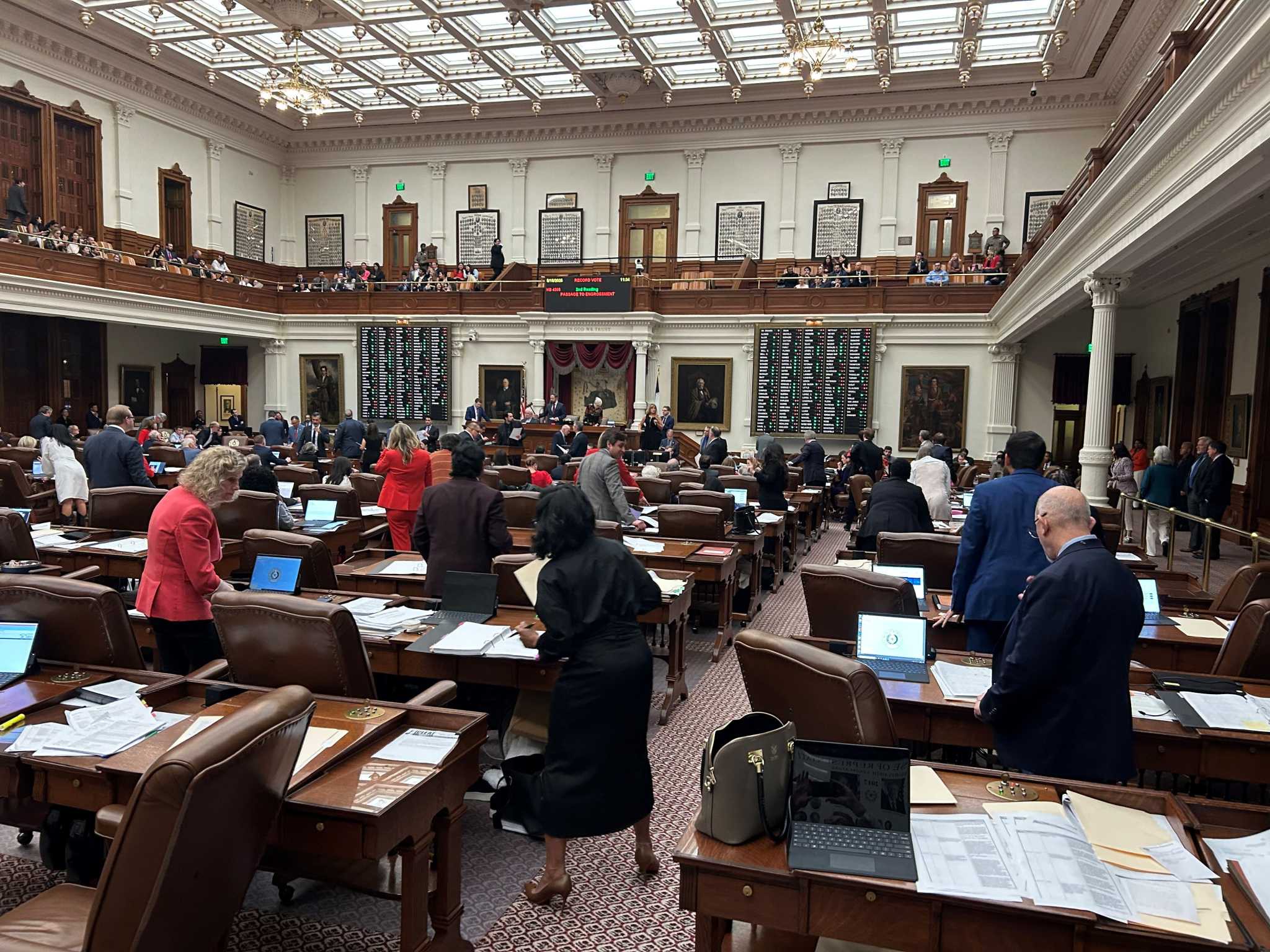politics
Dead Bills Find New Life in Texas Legislature's Salvage Yard
In the Texas Legislature, sometimes dead bills can be reincarnated. And on the last day to consider House bills, members were able to kill a lot of legislation simply by killing time.
Published May 18, 2025 at 10:05am by John C. Moritz

Texas Governor Greg Abbott, left, signs a series of business-friendly bills at the Texas State Capitol, May 14, 2025.
Sara Diggins/American-Statesman
Just after the clock struck midnight as Thursday night faded into Friday morning, the Texas House morphed into something of a graveyard.
Perhaps "a salvage yard" would be a more accurate way to describe it.
First, a little background. Thursday — Day 122 of the 140-day legislative session — was the last day for bills that originated in the House to be considered on first reading by that chamber under the rules its members agreed to in January.
Members of the Texas House scramble to pass bills in the face of looming deadline on May 16, 2025/
John C. Moritz/Austin American-Statesman
But the upshot was that Thursday's calendar was crammed with more than 400 bills the 150-member House did not take up earlier in the session. Given that the House gaveled in at 10 a.m., it was a given that scores of those bills would be stuck in the queue by the time the floor session would expire 14 hours later no matter how fast House managers might try to ram them through.
And, as it turned out, there wasn't a whole lot of ramming and jamming for the first 13 1/2 hours of the round-robin series of floor debates. In fact, the opposite was the case much of the time. That's because for nearly every bill that some members want to pass, there's often a passel of others who want it to die.
So, with a hard and fast deadline looming, one of the best ways to kill bills is to kill time. As bills were called up for debate, members lined up to ask questions about them, and the questions were often laden with histrionic and hyperbolic language. And sometimes, the questions were lighthearted. The practice is known in legislative parlance as "chubbing."
One question about putting more state regulations on food trucks, prompted Democratic state Rep. Terry Canales of Edinburg to ask questions of Republican state Rep. Brooks Landgraf of Odessa, the author of House Bill 2248, in Spanish. And Landgraf responded in kind.
The measure passed by a comfortable 86-31 margin, but it took up time.
But another bill, HB 3520 by Rep. David Spiller, R-Jacksboro, to lessen the amount of liability insurance coverage rideshare drivers need to carry, took up a whole lot more time. It came up for debate about 12 hours into the 14-hour floor session as one member after another drilled down into the minutiae of insurance law and of the rights of injured riders to be adequately compensated if a rideshare driver causes a crash.
That went on for about a half-hour, and nearly that much more time passed while the House parliamentarian studied whether one member's effort to kill the bill because of a procedural error was legally sound. Turns out, it wasn't, and the bill cruised to passage 85-32.
Throughout most of the chubbing and time-killing, House members for the most part remained eerily calm as the minutes and hours slipped away. That changed at 11:30 p.m. when the gallery began filling up with legislative staffers and lobbyists, which injected a charge of adrenaline into the members who had by then already struggled through back-to-back-to-back workdays that had stretched deep into the night.
The clock in the chamber of the Texas House strikes midnight on May 16, 2025, which was the deadline for members to pass bills that had originated in the House.
Alex Driggars/Austin American-Statesman
House Speaker Dustin Burrows accelerated his pace as he called bill after bill to the floor. The reading clerks morphed into auctioneers as they provided one-sentence descriptions of each piece of legislation.
Through it all, members urged them to go even faster and they hooted and cheered with the passage of each new bill. When the ornate clock mounted on the wall just below the section of the second-floor gallery that faces the speaker's rostrum hit the 11:55 p.m. mark, the pace was breakneck.
Members passed three bills in the final five minutes. They tried for a fourth but midnight struck before there was time to vote.
The last day's calendar was not a strategic list of must-pass bills, but actually a hodgepodge collection topped by leftovers. And those leftovers were there because many of the bills that the House had hoped to get to on Monday ended up being pushed to Tuesday because the chamber had run out of time.
And many of Tuesday's bills were pushed to Wednesday, meaning many of the proposals scheduled for Wednesday topped the list on Thursday. But once Thursday arrived, there would be no tomorrow to continue considering House bills.
But for all the bills that died with the stroke of midnight — and there were about 200 of them — many of them might actually remain on life support. And that's where the "salvage yard" comparison comes back into play.
Bills that die in one chamber can be revived as "spare parts" for bills that originated in the other chamber. If the intent of both pieces of legislation is roughly the same, the moribund measures can be tacked on as an amendment to the bill that's still breathing.
And there's still time. The House has until May 27 to take up Senate bills. And that means it might still be too soon to dig the graves of all the bills that didn't make Thursday's deadline. But the one drop-date that is absolutely certain is June 2. That's when the 2025 session must come to an end.

